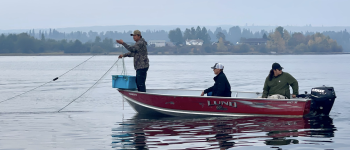Image Caption
Local Journalism Initiative Reporter
Windspeaker.com
Joy Haskell has some fond memories of her childhood.
Haskell, an Indigenous filmmaker, split her youth between the British Columbia city of Prince George and her Tl’azt’en Nation, also in B.C.
“During the summer being in the smokehouse is when families come back and we gather,” Haskell said as she discussed recollections of growing up. “And that’s when traditions are passed down but also that’s a time for us to catch up on family things and family who is away.”
An integral part of Haskell’s youth was learning about salmon. As a youngster she learned how to cut and prepare the salmon. And it was her aunts who passed on the tradition of going out and setting nets.
“There’s a particular way you have to wrap the fish net,” she said. “And there’s a particular way you wrap it back up to store it.”
Haskell said there was always plenty of fish to go around while she was growing up.
“We had an abundance of salmon,” she said. “Never in my wildest dreams did I ever think that I would never be able to go to my family’s smokehouse and not have salmon. That was never a thought to me.”
But times have changed. And Haskell is now doing her best to raise awareness about salmon concerns Indigenous people have, especially in her home province.
To this end Haskell has written and directed a documentary titled THE SALMON’S CALL.
The film will have its world premiere at the Red Nation International Film Festival on Nov. 15 in Los Angeles.
THE SALMON’S CALL, told through an Indigenous lens, features Elders, community members and youth in various B.C. communities. They discuss the spiritual and cultural relationship between Indigenous people and salmon and how those bonds are at risk.
Haskell explained how the concept for THE SALMON’S CALL came about.
“A few years ago I got commissioned by the David Suzuki Foundation to do two short videos for him about the salmon farms in Discovery Island (in B.C.),” she said. “He just wanted to do two social media videos and post the link on there to sign something to have it shut down.”
As it turned out, that particular fish farm was closed.
“But when I did my research for the fish farms, I always knew fish farms were bad but I didn’t realize how bad they were,” Haskell said. “And then I started thinking about my family. I started thinking about the routes that the salmon travel, one of them being to my home rez which is over 900 kilometres away.
“I don’t know why I didn’t think to ask but I phoned my family and some of my friends on Tl’azt’en rez and I asked them if they still get fish that have sea lice or diseases. And they do. So, that just added the more personal thing to me because whatever happens in the ocean doesn’t just affect the ocean in the surrounding areas, it affects the migration route of the salmon all the way down to my little rez in northern B.C. And then that will affect my family.”
Haskell felt it was vital for her film to have an entirely Indigenous lens.
“That was really important to me because a lot of things that I see are told by a scientific point of view, which is important,” she said. “But I haven’t seen a documentary that is an all-Indigenous lens. That is important to me because we were once caretakers of the land and waters. And it was just important for me to have that voice and to give the salmon that voice.”
Haskell added she has always been bothered by commercial fishing.
“We were taught to respect the land and respect the waters and not to take more than what we needed,” she said. “And so, what I learned about commercial fishing that was really disturbing to me.”
Haskell is hoping her film can get some important messages out.
“I would just like people to be aware that these salmon farms don’t just affect the west coast,” she said. “They affect further than the west coast. They affect all migration routes of the salmon.
“Fish are an important part of the ecological system but also to people and also to Indigenous culture. And traditions are passed down and I just want people to be aware of realize how important salmon are.”

